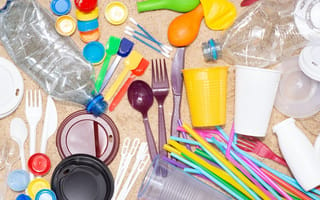
From the Rocky Mountains to the high plains, Colorado is known for its vast outdoor landscape. To help preserve the land, many Coloradans opt for compostable containers or reusable bags rather than single-use plastic alternatives. Now, states like California and Colorado, are putting bag ordinances in place hoping to further reduce the consumption of single-use plastic bags.
On July 1 a new ordinance went into effect costing Denver shoppers 10 cents for each disposable bag — whether it’s plastic or paper — provided by a store. Both the city and county of Denver said the fee is intended to reduce waste, prevent litter, protect the state’s waterways and encourage people to bring their own reusable bags.
A similar ban will soon apply to the entire state. Gov. Jared Polis signed a single-use plastic bill into law on July 6, however, the statewide law applies to more than just bags. It also means restaurants can no longer offer single-use foam containers. The statewide ban on foam containers and paper or plastic bags will begin in 2023 and go into full effect by 2024.
It’s not just local governments making this change. Several Colorado tech companies have been trying to make business owners and consumers more mindful about single-use products for years. Take PlasticScore for example. Founded in March of 2020, PlasticScore is a mobile app that allows customers to score restaurants based on their usage of single-use plastics and other single-use items.

PlasticScore’s app, which already has 4,000 reviews across the U.S., asks users if a restaurant used plastic or styrofoam packaging, or more sustainable options such as cardboard or a reusable container. This information is used to measure how eco-friendly the restaurant is and assigns the eatery with a rating between one and five turtles. In light of Colorado’s new law, PlasticScore CEO and co-founder Mladen Gajic said he plans to help restaurants transition from single-use items to more sustainable options.
Gajic is currently providing feedback to restaurants on a case-by-case basis but plans to roll out a dashboard for owners soon. The dashboard will allow restaurant owners to analyze their operations and improve their PlasticScore rating by switching from a single-use plastic or styrofoam to a more sustainable item.
“We also want to let restaurants know when these bans are coming through, when they need to be ready and when they are out of compliance,” Gajic said.
PlasticScore is also considering ways to support local governments by providing data on single-use plastic and foam usage in a given region.

Remark, another Denver-based app, also encourages businesses to be more sustainable. Through Remark’s app, consumers search for a business — like a bank, restaurant or retailer — then enter feedback about the business’s sustainability efforts. This consumer feedback is then compiled into a customizable email and sent to the business owner or CEO. A few days later, Remark contacts the business to offer solutions to become more sustainable.
“One way that we can help is by letting businesses know that their customers care about this and help informally enforce some of the ordinances and laws that are coming through. Versus getting a slap on the wrist from the government, customers can [provide feedback],” Jess Lybeck, CEO and co-founder of Remark, told Built In. “From a more macro level, consumers are really influencing businesses and businesses influence legislation and the law. And so we hope to provide more of a basis that consumers care about this, and businesses should care about this.”
Lybeck said she’s already seen restaurants change their ways from a customer sending an email through Remark’s platform. Remark launched earlier this year.

A third Denver-based business is tackling sustainability from the consumer side. The Happy Beetle, which launched in March, is a door-to-door recycling subscription service. Residents fill a large reusable bag with hard-to-recycle items like batteries, electronics, light bulbs, plastic bags, bicycle tubes, styrofoam and even wine corks and the Happy Beetle picks up the bag on a monthly or quarterly basis. These items are then sorted and properly recycled.
In light of the new regulations, Dave Kiefner, CEO and co-founder of the Happy Beetle, says he hopes that one day in the near future he won’t have to collect plastic bags. Although that may not be feasible, he does hope the new regulations and his business will make people more aware of their day-to-day plastic usage.
“I think [these regulations] are an awesome first step,” Kiefner said. “But there’s just so many complexities that I don’t think we realized. … Even as we’re collecting plastic bags, we had a hard time finding a facility that could take the volume of plastic bags that we were collecting. These items truly have been hard to recycle. The best thing we can do is eliminate their single-use from the very beginning.”




